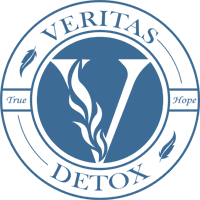According to the SAMHSA, around 21.5 million adults in the U.S. have a co-occurring disorder. A co-occurring disorder is when an individual is struggling with both a mental illness and substance use disorder. Left untreated, a co-occurring disorder can lead to life-threatening consequences. This is why seeking the right care to treat both conditions at the same time is essential. In this article, you’ll learn more about the benefits of dual diagnosis treatment and why it’s so critical to get the right care.
At Veritas Detox, we are a leading drug and alcohol detox center committed to helping patients safely and effectively overcome addiction and achieve long-lasting sobriety. We understand that each patient’s recovery journey is uniquely different. That’s why we offer a comprehensive range of treatments, from dual diagnosis treatment to drug and alcohol detox treatment, to support you along your road to recovery. Ready to start your recovery journey? Contact us today!
5 Benefits of Dual Diagnosis Treatment
Dual diagnosis treatment is essential for individuals struggling with a co-occurring disorder. Unfortunately, sometimes co-occurring disorders can be difficult to spot. This is why seeking a professional diagnosis is important if you suspect you’re struggling with a mental illness and addiction.
If you are struggling with a co-occurring, below are several benefits of dual diagnosis treatment.
1. Treats Both Conditions at the Same Time
First, dual diagnosis treats both a mental illness and substance use disorder at the same time. This is essential to ensure individuals suffering from a co-occurring disorder get the right care that they need to best recover and lead a healthier life. Failure to treat one condition, but not the other condition can increase your risk of relapsing. This is why if you suspect you may be struggling with a co-occurring disorder you seek a treatment center that offers dual diagnosis treatment.
2. Reduces Risk of Relapse
As mentioned above, failure to treat a co-occurring disorder effectively can increase your risk of relapse in the future. For example, if an individual is struggling with alcohol addiction and PTSD, if that individual treats their addiction and gets sober, but doesn’t address their PTSD, then their mental health disorder will increase their risk of relapsing with drugs or alcohol in the future. This is because the individual will have a difficult time coping with their PTSD symptoms because they likely turned to alcohol to relieve these symptoms.
3. Improves Overall Mental Health and Well-Being
Next, since dual diagnosis treatment addresses both addiction and mental illness, this inevitably helps improve an individual’s mental health and well-being. Many people struggling with untreated mental health disorders may oftentimes turn to drugs or alcohol as a means to try and cope with their mental illness. However, rather than managing their mental illness symptoms, consistent drug abuse only leads to dependency and addiction.
4. Offers a More Personalized Treatment Plan
Dual diagnosis treatment also offers tailored treatment so you can receive the best possible care to treat both conditions simultaneously. It’s crucial you receive the right care for your co-occurring disorder because, as discussed previously, a failure to treat both conditions can increase your likelihood of relapse.
5. Improves Overall Quality of Life
Finally, dual diagnosis treatment improves your overall health and quality of life for the better long-term. If you are struggling with a co-occurring disorder, you need to treat both conditions at the same time. You cannot ignore one condition hoping that getting sober will inevitably cure your mental illness. This is why comprehensive dual diagnosis treatment that helps you overcome addiction while managing your mental illness symptoms is so important.
Ready to Lead a Healthier, Happier Life?
As you can see, there are several benefits of dual diagnosis treatment for those struggling with a co-occurring disorder. Failure to treat both conditions at the same time can greatly increase your risk of relapse. This is why it’s critical to not only seek treatment if you are struggling with addiction and mental illness but also seek the right treatment to effectively overcome addiction and manage your mental illness symptoms.
At Veritas Detox, our team of compassionate addiction specialists is here to help you every step of the way along your road to recovery. We understand how debilitating a disease addiction is. That’s why we offer a wide range of treatment options and programs to ensure you receive the tailored care you need to best support your recovery journey. Contact us today to learn more about how we can best support your sobriety journey.



